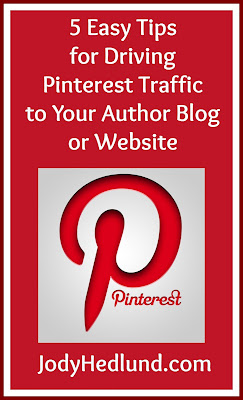
By Jody Hedlund, @JodyHedlund
Over the past two years Pinterest has become the number one source of traffic to my blog. In fact, when I wade through my blog statistics, Pinterest comprises over half of my traffic source now (more than twitter, google searches, etc.). Not only that, but even though I post less (only once a week on Tuesdays), my monthly page views continue to escalate.
I'm not a Pinterest expert by any means. Everything I've learned about Pinterest has come by trial and error. But over the past several years of using Pinterest regularly, I've realized that there are a few things that authors can do to maximize Pinterest in drawing traffic back to our blogs and websites.
No, I don't have a Pinterest business account. I still use my personal Pinterest account with my author hat on in an attempt to engage with readers as well as other writers. I have boards specifically for readers (boards about my novels as well as reading-related boards). And then I have boards for writers (including boards with writing and editing tips, writing humor, advice, etc.).
In fact, almost everything I pin on Pinterest is related in some way to being an author. I've decided to steer clear of more personal boards like my Christmas wish list, bathroom decorating ideas, ways to use empty toilet paper tubes, etc. Not that there's anything wrong with having those kinds of boards. I've just chosen to make Pinterest all about readers and writers instead.
With that specific focus, I've also attempted to make it as easy as possible for Pinterest users to discover more about me by clicking through to my blog and website. Here are a number of ways that I drive Pinterest users back to my cyber home:
1. Create your own Pins. Whether you use pictures from free sites (that allow for modification) or use pictures you take for yourself, it's VERY easy to create Pins. A person doesn't have to be a graphic designer to do it. There are free user-friendly sites for creating graphics (like Pic Monkey).
2. Make sure your graphics are Pinterest-friendly. If you spend any amount of time on Pinterest, you'll notice some Pins that grab your attention and others that you hardly notice. I've learned that vertical graphics tend to show up better on Pinterest while horizontal end up being much smaller and difficult to see. Font, color, and clarity are all important considerations as well. I have a secret board where I can pin graphics to see how they turn out before they go live.
3. Put your website address on every Pin. If you make the graphic, then claim it as yours. Put your stamp on it so that no matter where it goes in cyberland, the Pin always points back to you and your website. Also don't forget to put your website address into the Pin's description. Then anyone who clicks on the picture on Pinterest will be automatically taken to your Pin's landing spot on your website.
4. Make your Pins searchable. Pinterest has a search capability where a user can type in key words and pull up related boards or Pins. If you want your pins or boards to come up in other people's searches, then you need to use key words in your boards and with your pins. For example, if you have a board with funny reading pictures you wouldn't want to label it "Tickles My Funny Bone" even if that's true because that's not likely to come up in a search for reading related pins. Instead you would want to include words like reading, funny, or humor. My board is simply labeled, "Reading Humor."
5. Put your Pins on your website and blog (and not just on Pinterest). I make a least one graphic to go with every blog post. Then blog readers can pin directly from my blog to their Pinterest boards. I also have pinnable graphics throughout my website on various pages. I even have a slide show on my Reader Page for all of the reading-related pins I develop. All of those pins make my website attractive for Pinners, a place they can come and find lots of Pin-worthy graphics.
What about YOU? Are you finding strategic ways to use Pinterest to drive traffic to your blog or website?